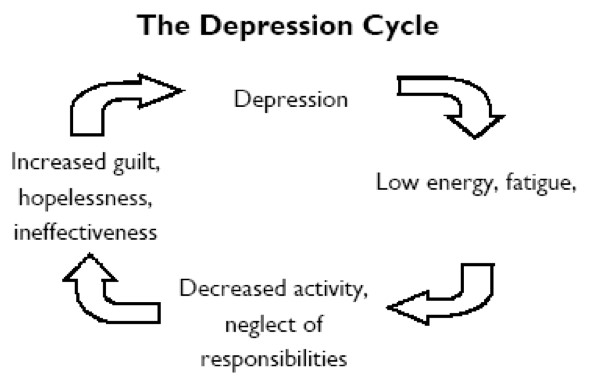Treatment for Depression: Behavioural activation

One of the main signs of depression is a marked decrease in interest or pleasure in nearly all activity. People may become disinterested in their hobbies, report a loss of enjoyment, withdraw from social and recreational activities and report they “just don’t care anymore”. People can also experience fatigue, loss of energy, a general slowing down, and report that simple tasks require huge effort and result in exhaustion.
It is therefore understandable that people experiencing depression experience a significant decline in their daily functioning. This can including changes such as; not seeing friends, ceasing exercise, neglecting responsibilities such as cleaning the house, not completing work/education projects done, and even struggling to shower regularly or get out of bed.
A cycle of depression is often at play, whereby someone who feels low, tired, disinterested, helpless, guilty, then withdraws from activity, which actually ends up making them feel worse, and so the cycle continues…

Image from Centre for Clinical Interventions
One way of breaking this cycle is by gradually increasing your activity level. This is often called Behavioural Activation and it works in many ways. By taking steps to be more active, over time you will usually begin to find some pleasure in the activities, feel better about yourself for getting some things done, see things from a different perspective, give yourself a break from worry and rumination, improve your body’s health and energy levels and create helpful changes in your body chemistry.
Of course this sounds easier said than done. I often talk to people who say things like “I just couldn’t go for my usual bike ride, it seems way too far”, “there is just so much mess in the laundry I couldn’t even face it”, “I haven’t seen my friend for ages, but the thought of going to their birthday party tomorrow night is too exhausting” or “it seemed too hard to get out of bed”.
So here are some very important and helpful tips to keep in mind when getting started on Behavioural Activation…
- Set regular goals – try to be specific about when/what activity you will aim to do. The more specific you are the more helpful that can be and writing a plan can be helpful too.
- Take small steps – remember to be kind to yourself and modify your expectations. Setting too big a goal is one of the main reasons people struggle to take the first step. For example, taking a gentle walk around the block (instead of going to the gym), making your bed (instead of cleaning the whole room) are great steps that might be more realistic.
- Try a variety of activities – pick some fun activities that are more likely to lead to some pleasant feelings, as well as some activities that might seem boring (e.g., taking out the rubbish, sorting out some paperwork). Even these ‘boring’ activities can lead to a sense of achievement or to thoughts that you are making some progress.
- Consider setting a time for your target goal – For example, working on that task for 5 minutes, rather than sticking at it to completion. Or reading for 5 minutes, rather than finishing a whole chapter.
- Encourage yourself and enlist some support – remind yourself why you are committing to the activities, ask your friend or family to give some gentle encouragement.
- Be flexible – if you really can’t complete a desired goal, then don’t give up. Be flexible. What small step could you take in the direction of your goal instead? For example, if you don’t feel able to leave the house for some gentle exercise, could you do some stretches at home? If you don’t feel able to wash the dog, could you get all the gear set up for tomorrow or play with the dog for a while instead?
- Lastly, keep track of what you notice. Pay attention to how you feel before and after the activity. Remember, you might not always feel better right away, but you may feel a sense of achievement.
What step might you be ready to take today?
If you are uncertain where to start you may find this guide from the Centre for Clinical Interventions helpful or contact us at the practice on 63811 0071 to meet with a Psychologist to help you overcome your depression.